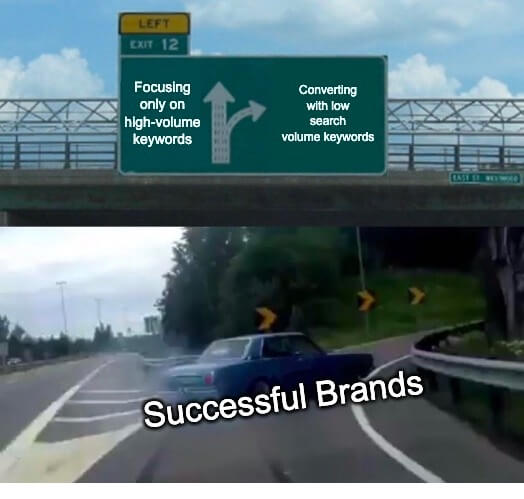The 8 Top Misconceptions of SEO | The Shocking Truth
by Joseph Jones • April 8, 2024
Many brands across the country struggle to grasp the concept of SEO, but it’s not for a lack of trying.
SEO can already be a complex marketing strategy to understand if you’re not a marketer specializing in it, and it can be made even more difficult with the hundreds of SEO myths floating about on the web.
We get it, there’s a LOT to SEO!
In this article, we’ll look at some of the top SEO misconceptions and counter them with some facts about SEO.
We’ll warn you; you’ll be shocked to find that not everything you’ve heard about SEO is true!
The Most Common Myths About SEO
Apart from the biggest myth about SEO—that being that SEO is dead—there are so many others out there.
SEO Myth #1: You Should Use As Many Keywords As Possible
You wouldn’t overstuff a turkey, would you? Okay, maybe that’s a horrible comparison…
Keyword stuffing is one of the quickest ways to lose rankings for your brand, and keyword density is still an important factor to take into consideration when writing content for your site. Many marketers will argue that you need to have as many keywords as possible to outrank your competitors, but that’s simply not the way to go about it.
Why?
Because keyword stuffing will harm your content’s quality and readability. You want search engines to pick up on your targeted keywords, but you still want your content to be easily understood by your readers (human readers), and unnatural keyword placement for the sake of adding as many keywords as possible makes it hard to do so.
Fact: Keywords are still important to focus on throughout your on-page content.
While there is no definite percentage you should aim for when it comes to keyword density, an unofficial guideline has been 1-2% of your copy’s overall word count. Ultimately, just make it sound natural and place keywords in your headings.

SEO Myth #2: You Should Focus Your SEO Strategy On Google ONLY
Definitely not true for everyone!
While Google is the leading and most popular search engine today, it’s not the only one out there, and who says it will be the leader forever?
Because of its popularity, many companies come to the misguided conclusion that if they’re successful in ranking on Google, they’ll become the leader in their industry. While it can be a huge help, neglecting other search engines can hinder your growth.
Bing, Yahoo!, and DuckDuckGo are other names that may come to mind when you think about search engines but think about other apps you use daily.
Social media platforms like Instagram, TikTok, and YouTube (one of the most popular video search engines) have found their way into the mix, and their unique algorithms have only opened up more opportunities for brands and their SEO strategies.
More on this later in the article, but putting all your eggs in one basket (Google) can leave you vulnerable to your competitors.
Fact: Google is important to focus SEO efforts on in most industries, but your industry, product, or service might also have high performance on other search engines.
SEO Myth #3: Local SEO Is A Waste
One of the biggest marketing mistakes you can make is underestimating local SEO. We know that’s a bold claim, but hear us out.
Say you’re a small business, let’s say a thrift store—that’s what the kids are into nowadays, apparently—and you want to bring in more people to your store. Most people that are going thrifting are probably going to search “thrift stores near me” or “thrift store in [city name]”. This is a huge opportunity to dominate those keywords and show up in places like Google and Google Maps when those specific search queries are inputted.
While you can still target more broad keywords like “thrift stores” and “local thrift stores”, for example, you give your business a higher chance of reaching your local audience by using local SEO.
If that’s not enough to sway you, let us hit you with this fact about local SEO: According to Google, searches for “near me” keywords have grown globally by over 400% YoY (as of September 2022).
Fact: Local SEO works for most web pages when trying to rank for local search queries, but you’ll want to identify if your GBP (Google Business Profile) is useful in your local search strategy. Find out what search engines are using in the SERPs for different keyword queries and optimize for that real estate space.
SEO Myth #4: SEO Will Make Your Website Traffic Explode Overnight
This may be hard to hear, but investing in an SEO strategy does not guarantee page 1 SERP (search engine results page) success, especially not in a short period.
There are ways to create a successful SEO strategy that can improve your chances of ranking well across search engines, and that comes down to working with the right team of marketers and most importantly: having patience.
SEO is a long game, and too many brands expect quick results, which leads to frustration, and disappointment, and can leave them vulnerable to dishonest agencies that will promise them quick results for their financial gain, and then the cycle repeats itself.
So, if you want to reap the benefits of effective search engine optimization strategies, don’t fall for SEO myths like this one.
Fact: SEO can see huge upticks in traffic very quickly if done properly. This will vary from website to website, but it’s possible to see major increases in traffic through direct strategies that are well-executed.
SEO Myth #5: You Only Need To Implement An SEO Strategy Once
Among some of the more dangerous myths about SEO is that it is a set-it-and-forget-it type deal.
Wouldn’t that be nice?
We set up a strong SEO strategy for your brand, target the hottest keywords, and then we all go relax on a beach while the traffic and cash start flowing in!
Unfortunately, this strategy would land us all on the beach permanently…
SEO is an ongoing process, and the need to shift is the most crucial part of this marketing tactic. Keyword rankings constantly change, and so do best practices, which means ongoing optimization for your content, website speed, and many other SEO tactics.
Ideally, companies should be updating their SEO every time a new search engine algorithm, update rolls out for the best results.
Fact: Optimizing the website once for search engines can prove results, but since organic interest changes over time and the web is increasingly changing, this would be a poor strategy for long-term goals.
SEO Myth #6: You Shouldn’t Bother With Low-Volume Search Terms
A lot of marketers starting in the industry may fall victim to the misconception that targeting low-volume, long-tail keywords is a waste of time. Why would an agency include such niche keywords that no one is searching for, after all?
It all comes down to capturing audiences and higher conversions.

Going back to our previous example, there’s high competition among short-tail, high-volume keywords like “thrift stores.” But, if you happen to run a thrift store that specializes in a niche fashion trend, maybe something like festival wear, or rave attire, or grandfather clothes (thanks Macklemore), you might do some research on terms like “thrift stores for rave clothes.”
The search volume won’t be anywhere near as high as it is for “thrift stores,” but that specific audience searching for a rave outfit will more than likely stumble across your store and turn into a conversion because you are addressing a very specific need they have.
And at the end of the day, that’s what marketing is all about!
Fact: Users are more likely to convert with long-tail keywords that are more specific to their needs than with short-tail keywords. However, both can convert. Smaller companies that are looking for an edge in SEO performance should focus on the long-tail keywords that can make them stand out and rank higher in the SERPs faster.
SEO Myth #7: SEO Is Only Viable For Larger Companies
What’s the point of trying to rank for keywords and fight over spots on Google when there are large companies out there with more money to throw at SEO strategies?
This comes from the SEO myth that is it impossible to compete against large companies with larger marketing budgets. While money can play a role in how much you have available in terms of resources, it does not always buy the best tactics.
Knowledge will always outperform budget when it comes to SEO, so if you have a dedicated team that is willing to look at the facts about SEO to refine strategy, you’re just as likely to make an impact on the search engines as the big guys.
Fact: It’s harder for smaller businesses to outrank larger ones in the SERPs for particular keywords. You have to find which keywords suit your audience the best and go for making your business stand out rather than being the “everything for everyone” company.
SEO Myth #8: Social Media Has Nothing To Do With SEO
We told you we’d come back to this one.
As we’ve mentioned, SEO is finding its way onto social media, and while Google and other search engines are still the main focus for these strategies, social signals such as shares, likes, and comments on social media posts can influence brand trust.
Additionally, optimizing things like YouTube video titles can help your videos appear as top results during a Google search. Think about it; how many times have you YouTube’d a question?
Fact: The fact of the matter is that social media platforms are acting more and more like search engines every day. Customers are sometimes using social media as a means to do their searching online instead of traditional search engines like Google, so you need to understand what your target demographic(s) is and if you’re targeting the right areas where they spend their time.
Clarifying SEO Misconceptions With Results
Don’t worry, not everything you’ve heard about SEO is a myth.
One thing remains true; you need an experienced team to run your search engine optimization strategy. Let Disruptive show you why these are myths. We focus on proven, effective SEO strategies that will help drive real results for your brand.
Get your free audit today and let’s get started!





